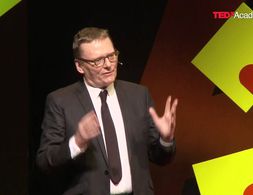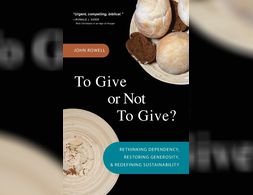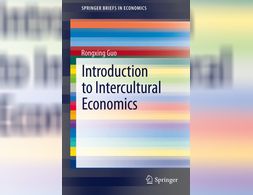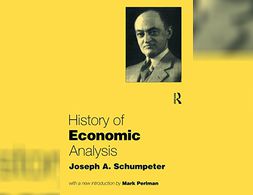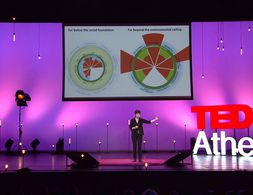✕
436 results
James Robinson gives in this talk a short introduction into the theory and ideas of his popular book "Why Nations Fail" which was published together with D. Acemoglu in 2012. With many real-life examples he gives a lively description on the fundamentals for economic success from an institutionalist view. According to Robinson, the nature of institutions is a crucial factor for economic success. Whether institutions are inclusive (such as in prosperous economies) or extractive (poor economies) stems from the nation's political process and the distribution of political power.
In her short contribution, the author questions how the value of goods and services is shaped in current neoclassical teaching. She criticizes the principle of pricing based on marginal income. She discusses what can be called wealth generating, what kind of wealth we need and points out a lack of a value theory.
Banner and Pastor debunk granted assumptions of the neoclassical theory, such as self-interested human behavior, the necessity of inequality and growth, to pull the threads between the new possible foundations of our society, "prosperity, security and community".
This journal article by Radhika Desai, Professor at the Department of Political Studies, and Director of the Geopolitical Economy Research Group at the University of Manitoba, Winnipeg, Canada, was originally published in 2010 and republished in an revised format in 2020. The article is a comprehensive treatment of Marx's theory of crisis, focusing on the role of consumption demand in capitalism and in the emergence of crises.
Modern authors have identified a variety of striking economic patterns, most importantly those involving the distribution of incomes and profit rates. In recent times, the econophysics literature has demonstrated that bottom incomes follow an exponential distribution, top incomes follow a Pareto, profit rates display a tent-shaped distribution. This paper is concerned with the theory underlying various explanations of these phenomena. Traditional econophysics relies on energy-conserving “particle collision” models in which simulation is often used to derive a stationary distribution. Those in the Jaynesian tradition rely on entropy maximization, subject to certain constraints, to infer the final distribution. This paper argues that economic phenomena should be derived as results of explicit economic processes. For instance, the entry and exit process motivated by supply decisions of firms underlies the drift-diffusion form of wage, interest and profit rates arbitrage. These processes give rise to stationary distributions that turn out to be also entropy maximizing. In arbitrage approach, entropy maximization is a result. In the Jaynesian approaches, entropy maximization is the means.
Mark Carney explains how we have come to esteem financial value over human value and how we have gone from market economies to market societies, how economic theory foundation affect the society as a whole, how we understand our world today and ultimately how this affects our lives.
In this course we will critically analyze both economic theory and economic life through the lens of gender. Topics covered include: a critical examination of gender patterns and trends in the household, labor market, and the firm; issues concerning gender inequalities in the economy.
This lecture is based on the “Introducing the Economy” chapter from the Economy Studies book, which introduces the first building block in their framework for transforming the economics education. The aim is to give students a feel and
understanding of the economy as part of a bigger whole. Thus, it is aimed to introduce to students before getting into the economics curriculum with theory and models.
This is a revolutionary and powerfully argued feminist analysis of modern economics, revealing how woman's housework, caring of the young, sick and the old is automatically excluded from value in economic theory. An example of this pervasive and powerful process is the United Nations System of National Accounts which is used for wars and determining the balance of payments and loan requirements.
Why are some nations more prosperous than others? Why Nations Fail sets out to answer this question, with a compelling and elegantly argued new theory: that it is not down to climate, geography or culture, but because of institutions.
Geographical economics starts from the observation that economic activity is clearly not randomly distributed across space. This revised and updated introduction to geographical economics uses the modern tools of economic theory to explain the who, why and where of the location of economic activity. The text provides an integrated, first-principles introduction to geographical economics for advanced undergraduate students and first-year graduate students, and has been thoroughly revised and updated to reflect important developments in the field, including new chapters on alternative core models and policy implications.
The Microeconomics of Complex Economies uses game theory, modeling approaches, formal techniques, and computer simulations to teach useful, accessible approaches to real modern economies.
The Learning Economy and the Economics of Hope' brings together the most important contributions by an expert on policies, management and economics of innovation and knowledge. It offers original insights in processes of innovation and learning and it draws implications for economic theory and public policy. It introduces the reader to important concepts such as innovation systems and the learning economy.
This book sets out to encourage a debate about the role that economic theory and philosophy of economics can play. A good part of economics consists of theoretical developments which describe completely imaginary worlds and have no connections to actual market economies
In the graveyard of economic ideology, dead ideas still stalk the land.
The recent financial crisis laid bare many of the assumptions behind market liberalism—the theory that market-based solutions are always best, regardless of the problem. For decades, their advocates dominated mainstream economics, and their influence created a system where an unthinking faith in markets led many to view speculative investments as fundamentally safe.
Modern mission theory is guided largely by the three self paradigm that suggests indigenous churches can only be healthy if they are self-governing, self-propagating, and self-supporting. Consequently, Western missionaries, their churches, and their agencies have been increasingly indisposed to giving generously. We must rethink the interplay of dollars dependency and what it means to do the right thing with our money as we pursue twenty-first century missions.
The age of the contemplative economist-scholar—at home equally in classical languages, economic history, the history of ideas, and mathematical theory—has passed. The history of economics as a subdiscipline has lost touch with the mainstream study of economics. InThe Future of the History of Economics, internationally known scholars from ten countries provide a comparative assessment of the subdiscipline.
This book presents a methodological framework for the analysis of intercultural issues frequently misinterpreted by existing theories. It uses a challenge-and-response theory of cultural development to examine the relationship between different natural disasters and threats and the developments of ancient civilizations.
Readers of economic and political theory as well as students of economic planning will appreciate this classic, now available for the first time in English. Written eighty years ago, when Sorel became disillusioned with the official socialism of the German and French Marxist parties, this new translation presents Sorel's analysis of the rise and fall of the two great modern ideologies: socialism and liberal capitalism.
In this classic work of economic history and social theory, Karl Polanyi analyzes the economic and social changes brought about by the "great transformation" of the Industrial Revolution.
At the time of his death in 1950, Joseph Schumpeter was working on his monumantal History of Economic Analysis. Unprecedented in scope, the book was to provide a complete history of economic theory from Ancient Greece to the end of the Second World War. A major contribution to the history of ideas as well as to economics, History of Economic Analysis rapidly gained a reputation as a unique and classic work.
In the last half century, economics has taken over from anthropology the role of drawing the powerful conceptual worldviews that organize knowledge and inform policy in both domestic and international contexts. Until now however, the colonial roots of economic theory have remained relatively unstudied. This book changes that.
Macroeconomics in Context: A European Perspective lays out the principles of macroeconomics in a manner that is thorough, up to date, and relevant to students. With a clear presentation of economic theory throughout, this latest addition to the bestselling "In Context" set of textbooks is written with a specific focus on European data, institutions, and historical events, offering engaging treatment of high-interest topics, including sustainability, Brexit, the euro crisis, and rising inequality. Policy issues are presented in context (historical, institutional, social, political, and ethical), and always with reference to human well-being.
In this 5 weeks online course, the Global Change Institute from the University of Queensland explains different types of climate change policies, the economic theory at their basis and the possible output. Starting from the fundamentals of carbon and climate change policies, and how they have been applied worldwide, the course aims to teach fundamental skills to move towards a low carbon economy.
This course is an introduction to macroeconomics with a specific focus on the euro area. The theoretical part provides a critical presentation of the two key macroeconomic models: the (neo)classical approach and the Keynesian approach. This allows a comparative analysis of important macroeconomic topics:
- unemployment
- inflation
- government debt and Modern Monetary Theory
- banks and financial crises.
The policy-oriented part discusses the monetary policy of the ECB and the specific challenges for fiscal policy in the euro area. The course also presents other euro area specific topics: Optimum currency area, euro crises, Next Generation EU and Green New Deal.
Devine begins with an analysis of the theory and practice of capitalist planning, central planning and 'market socialism'. He argues that, while market socialism is currently favoured by many economists who reject both capitalism and the command planning of the Soviet model, it cannot fulfil the promises held out for it.
In the course Sociology and Socialism, students engage with classical theories of socialism as well as their applications in a variety of historical and international contexts. Staunchly interdisciplinary, the course utilizes expertise in philosophy, history, economics, sociology, anthropology and political theory.
"The New Classical Macroeconomics "gives an accessible, rigorous, critical account of the central doctrines of the new classical economics, without unnecessarily difficult mathematics. It focuses on four central issues: the foundation of monetary theory; monetary and fiscal policy; labour supply and business cycles; and the attack on econometric models.
The productive work of widely distributed academic research has contributed substantially, over the postwar period, to important advances in our understanding. It has also offered a clearer recognition of many unresolved problems. Never theless, the progress achieved over the last decades, ex hibited by the systematic application of "theory" to actual issues and observable problems, could not overcome a per vasive sense of dissatisfaction.
As seen with the United Nations significant promotion of the Sustainable Development Goals (SDGs) in the past few years, the issue of global development is of growing concern to many international organizations. As humanity continues to become more interconnected through globalization, the inequalities and injustices experienced by inhabitants of impacted countries becomes increasingly clear. While this issue can be observed in the papers of different types (e.g., different schools of thought) of economists throughout the world, the work of behavioral and complexity economists offer a unique, collaborative perspective on how to frame decisions for individuals in a way that can positively reverberate throughout society and throughout time.
This talk was given at a local TEDx event, produced independently of the TED Conferences. Economic theory is centuries out of date and that's a disaster for ...
Fighting Neoliberalism with Keynes & Minsky? Riccardo Bellofiore proposes to revise the insights of Minsky's financial instability hypothesis, combining it with the Keynesian theory of the monetary circuit to answer many questions in modern economy.
We use cookies on our website. Click on Accept to help us to make Exploring Economics constantly better!

